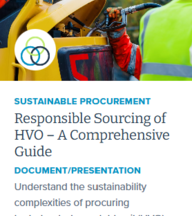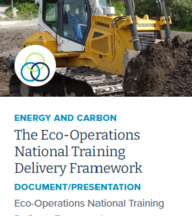Supply Chain Sustainability School
Supply Chain Sustainability School
Launched in 2012, the Supply Chain Sustainability School is an award-winning free virtual learning platform around sustainability, with the aim to upskill those working within, or aspiring to work within, the built environment sector.
- Wide range of CPD-accredited interactive online courses
- Structured learning paths tailored to specific roles and sectors
- Webinars on key topics, live or on-demand
- A library of 3,500+ resources, including guides and case studies
- All free to members
As a partner, CPA contribute funding and expertise to the school to ensure that it remains free for learners and representative of the industry.
To find out more, or to become a free member of the School and gain access to these resources, please visit: https://www.supplychainschool.co.uk/about/membership/
Responsible Sourcing of HVO - A Comprehensive Guide

This comprehensive guide, supported by 12 of the School's Partners, describes in detail the sustainability benefits and risks of procuring and using HVO as an alternative to fossil diesel as part of a Net Zero carbon reduction strategy. It provides facts and figures, gleaned from other published and peer-reviewed reports on these impacts, as well as advice and guidance, through several recommendations, on what you can do to mitigate these risks.
Air Quality for Plant & Equipment

This module will give you an introduction to the sustainability issues associated with air quality for plant and equipment and non-road mobile machinery.
The Eco-Operations National Training Delivery Framework

Machine plant usage has been identified as a contributor to carbon-based emissions. To reduce this, the aim is to reduce engine-derived emissions from plant through both minimising engine run time (and engine idling) and the more efficient use of equipment. This requires the delivery of an education programme that provides vital learning on how to achieve this.
The Eco-operations National Training Delivery Framework sets out the parameters for the consistent delivery of the education required and identifies and provides guidance on areas such as core and optional learning outcomes, delivery content and methodologies, assessment strategies and course durations. As the learning content can vary for a number of occupations, the framework further identifies individual course content and delivery factors for Plant Operatives, Supervisors, Plant and Site Managers, Planners, Plant Procurers, Maintenance Personnel, etc.
